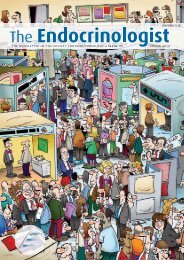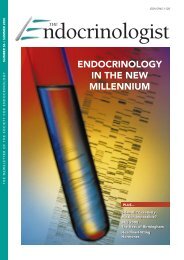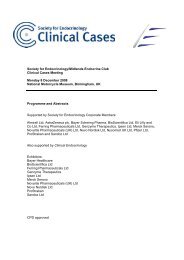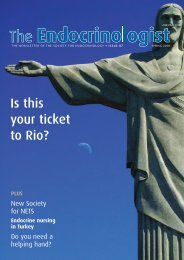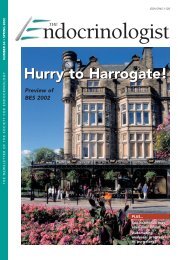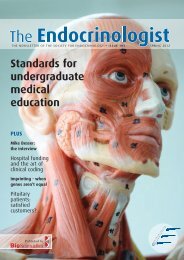Download issue 100 (pdf) - Society for Endocrinology
Download issue 100 (pdf) - Society for Endocrinology
Download issue 100 (pdf) - Society for Endocrinology
You also want an ePaper? Increase the reach of your titles
YUMPU automatically turns print PDFs into web optimized ePapers that Google loves.
SOCIETY NEWS<br />
6<br />
THE DOCTOR & THE MASTER<br />
On Thursday 21 April, the <strong>Society</strong> <strong>for</strong> <strong>Endocrinology</strong><br />
visited the Edinburgh International Science Festival<br />
2011 to deliver a public event on the pituitary gland –<br />
The Doctor & the Master. Edinburgh International<br />
Science Festival held the world’s first celebration of<br />
science and technology in 1989, and has since<br />
organised a science festival annually to encourage<br />
people of all ages and backgrounds to discover the<br />
wonder of the world around them.<br />
Professor Steve Shalet (Christie Hospital, Manchester)<br />
started proceedings by introducing himself as an<br />
endocrinologist and explaining what an endocrinologist<br />
does. By setting the scene in this way, he was able to use<br />
the ‘master gland’ as a model <strong>for</strong> endocrinology, and<br />
give the 70 or so people present in the audience more<br />
insight into the field as a whole.<br />
Professor Shalet then described the anatomy and<br />
physiology of the pituitary gland, be<strong>for</strong>e going on to<br />
discuss its function in the body at large. His endocrine<br />
experience shone through in detailing the remarkably<br />
complex system of hormones that defines the interaction<br />
between the hypothalamus, pituitary, and target organs,<br />
saying of feedback mechanisms ‘it is a beautiful system,<br />
which is why endocrinologists love the pituitary’. The<br />
session then moved on to how pituitary dysfunction can<br />
cause disease, and discussed mass lesion effects such as<br />
Rare Disease UK<br />
At this year’s <strong>Society</strong> BES meeting we invited Rare<br />
Disease UK (RDUK, www.raredisease.org.uk) to talk to<br />
the many patient groups with whom the <strong>Society</strong> works.<br />
RDUK was <strong>for</strong>med, in part, in response to the European<br />
Commission’s call <strong>for</strong> the development of a rare disease<br />
strategic plan in all Member States by 2013.<br />
Individually, a rare disease will affect no more than 5 in<br />
10 000 of the general population at any one time, yet<br />
collectively rare diseases affect over 3.5 million people in<br />
the UK. RDUK’s latest project ‘Experiences of rare<br />
diseases’ documents the experiences of patients with rare<br />
diseases to identify shared problems. It highlighted that a<br />
lack of in<strong>for</strong>mation can lead to unin<strong>for</strong>med health<br />
decisions, lengthy delays in diagnosis, frequent<br />
misdiagnosis, a lack of support, poor usage of transitional<br />
services and patchy access to treatment.<br />
Obstacles to addressing these problems all stem from the<br />
nature of rare diseases; the diffuse patient populations<br />
af<strong>for</strong>d scant research opportunities, and the apparent<br />
absence of a market means that the area is one that is<br />
traditionally neglected by the pharmaceutical industry.<br />
Since the publication of a European Commission report<br />
in 2008, ef<strong>for</strong>ts to overcome this have escalated in<br />
preparation <strong>for</strong> the drafting of the strategic plans in<br />
2013. RDUK’s own recommendations state that the UK’s<br />
plan should be independent of NHS re<strong>for</strong>ms, adaptable<br />
T H E E N D O C R I N O L O G I S T • I S S U E 1 0 0 • S U M M E R 2 0 1 1<br />
visual disturbances and functioning and non-functioning<br />
tumours. In closing, Professor Shalet painted a vivid<br />
picture of the astounding changes that can take place in<br />
pituitary disease, from Cushing’s disease to acromegaly<br />
and diabetes insipidus.<br />
At this point the floor was handed to Dr Rob Murray (Leeds<br />
Teaching Hospitals NHS Trust), whose job it was to discuss<br />
the management of pituitary disease. Dr Murray per<strong>for</strong>med<br />
admirably, dealing with such topics as past and current<br />
surgical management of pituitary tumours (accompanied<br />
by some dramatic MRI scans from his and colleagues’<br />
clinics), radiotherapy and gamma knife, and the medical<br />
management of pituitary conditions, including hormone<br />
replacement and an interesting diversion into drugreceptor<br />
interactions. A lively question and answer session<br />
followed – the audience clearly shared in the fascination<br />
that the pituitary gland holds <strong>for</strong> endocrinologists.<br />
The <strong>Society</strong> <strong>for</strong> <strong>Endocrinology</strong> would like to thank<br />
Professor Stephen Shalet and Dr Robert Murray <strong>for</strong> giving<br />
up their time to speak at the event. Those of you who<br />
would like to hold your own public event may be<br />
interested in the <strong>Society</strong>’s new Public Engagement<br />
Grants, which will provide up to £<strong>100</strong>0 <strong>for</strong> members to<br />
hold public engagement activities. Keep an eye out later<br />
this year <strong>for</strong> more in<strong>for</strong>mation.<br />
TOBY STEAD<br />
to the health services of each of the four Home Nations<br />
and should champion a more effective, targeted use of<br />
resources: delayed and frequently mistaken diagnoses are<br />
inherently wasteful.<br />
Many are agreed that collaboration will be a key component<br />
in any effective strategy <strong>for</strong> rare diseases, and central to this is<br />
patient action – Rare Disease Day (28 February, 29 February<br />
on leap years) will see patient advocacy groups assemble at<br />
their Home Nation’s Parliament to demonstrate to MPs the<br />
impact of rare diseases.<br />
Great initiatives are springing up everywhere as<br />
in<strong>for</strong>mation networks improve. The OrphaNet rare disease<br />
registry is just one example. So what can we do in the<br />
run up to 2013? One important <strong>issue</strong> is the perception<br />
that stakeholders are few in number, and the best way of<br />
overcoming this is to contact your MP. For those that<br />
have ideas and wish to be involved, RDUK are holding a<br />
consultation on the UK’s draft strategy later this year, and<br />
will hold a workshop on the consultation to in<strong>for</strong>m their<br />
response. Any and all who have something to say are<br />
encouraged to take part.<br />
The <strong>Society</strong> <strong>for</strong> <strong>Endocrinology</strong> is a member organisation<br />
of Rare Disease UK, an alliance of key stakeholders<br />
brought together to develop strategic planning <strong>for</strong> rare<br />
diseases in the UK.


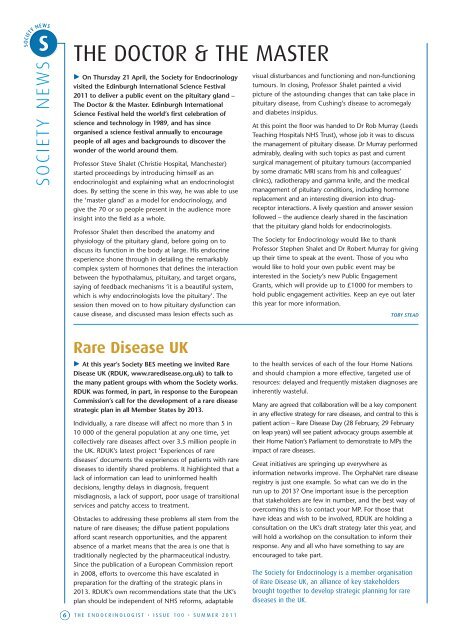
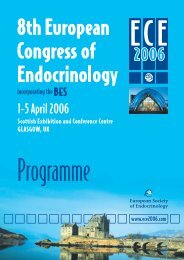
![The Endocrinologist | Issue 99 [PDF] - Society for Endocrinology](https://img.yumpu.com/48213777/1/184x260/the-endocrinologist-issue-99-pdf-society-for-endocrinology.jpg?quality=85)
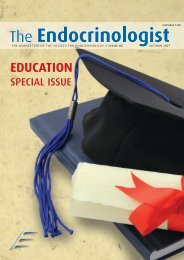
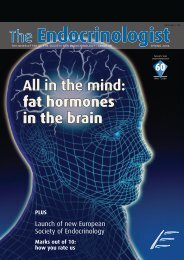
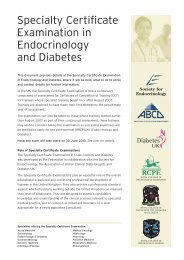
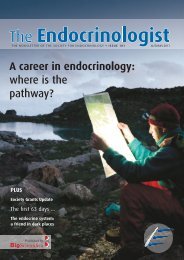
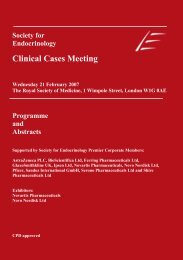
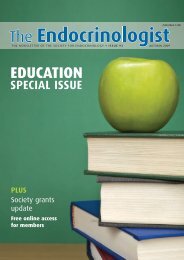
![The Endocrinologist | Issue 97 [PDF] - Society for Endocrinology](https://img.yumpu.com/40840065/1/184x260/the-endocrinologist-issue-97-pdf-society-for-endocrinology.jpg?quality=85)
